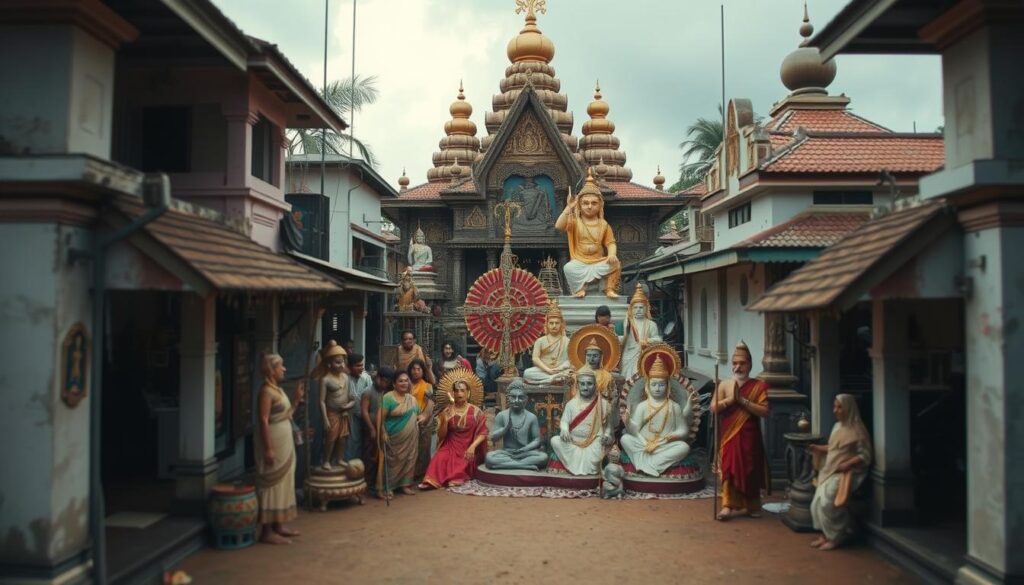Sri Lanka’s September 2024 Merchandise Exports Decline by 3.5%
Sri Lanka’s merchandise exports in September 2024 reached $937.95 million. This marks a 3.49% drop from the same month last year. The decline stems from the ongoing economic recession and global market contraction.
These factors have hurt the country’s export trade. The export slump has widened the trade deficit. This highlights the need for policy reforms to boost export competitiveness and diversify products.

Services exports showed a positive trend in September 2024. They increased by 6.08% to $329.89 million compared to 2023. However, the total value of merchandise and services exports fell by 1.17% from last year.
The export sector is vital for Sri Lanka’s economy. It generates foreign exchange and creates jobs. In 2023, Sri Lanka’s GDP was $84.36 billion in nominal terms.
The GDP in purchasing power parity terms was $318.55 billion. Forecasts predict a growth rate of 4.4% for the fiscal year 2024.
Export Performance in September 2024
Sri Lanka’s exports faced hurdles in September 2024. Merchandise exports fell by 3.49% to $937.95 million. The apparel and textile sectors slowed, while logistics and currency issues added to the decline.
Services exports grew by 6.08% to $329.89 million compared to September 2023. This growth helped balance some merchandise sector losses. It shows the value of diversifying exports.
Total Exports Decline by 1.17%
Total exports reached $1,267.84 million in September 2024. This marks a 1.17% drop from 2023. The fall in merchandise exports caused this overall decline.
Lower earnings from tea, rubber products, electronics, and seafood contributed to the decrease. The government introduced the Export Development Reward Scheme to tackle these issues.
This scheme rewards exporters for increasing their export volumes. Large exporters get a 2% reward, while SMEs receive 3.5%. The aim is to boost export earnings by $600 million.
These initiatives offer hope for a stronger export sector. They encourage value addition and product diversity. This approach could help Sri Lanka navigate current challenges and build a more resilient future.
Major Exports with Positive Growth
Several key sectors in Sri Lanka showed growth despite overall export decline in September 2024. Apparel and textile exports rose 15.71% to $418.68 million. This was mainly due to a 36.87% increase in exports to the US market.
Coconut-based products grew 10.36% compared to last year. Coconut kernel products increased by 9.29%, while fiber products rose 9.39%. Remarkably, coconut shell products surged by 814.8%.
Spices and Concentrates Exports Soar
Spices and concentrates exports grew 26.39% to $48.04 million. Pepper exports increased by 43.91%, while cinnamon rose 16.34%. Food and beverages exports also grew 8.78% to $33.21 million.
Processed food showed significant growth of 69.41%. This sector’s performance contributed to the overall positive trend in exports.
ICT Exports and Logistics Services Poised for Growth
The ICT sector is expected to grow despite economic challenges. ICT exports may increase 28.66% to $150.28 million in September 2024.
Logistics and transport services could grow 24.94% to $158.4 million. These sectors show resilience and potential in current economic conditions.
Major Exports with Negative Growth
Key sectors of Sri Lanka’s export economy saw negative growth in September 2024. Tea exports fell 2.44% to $117.03 million. Bulk tea exports dropped by 10.26%.
Rubber and rubber finished products exports decreased 4.1% to $79.5 million. Pneumatic and retreated rubber tires and tubes declined 12.19%. The electrical and electronics components sector plummeted 27.73% to $28.1 million.
Seafood exports plunged 42.18% to $14.83 million. Frozen fish, fresh fish, and shrimps all performed poorly. Ornamental fish exports fell 14.23% to $2.17 million. Other export crops declined 73.57%.
These declines contributed to a 3.5% decrease in Sri Lanka’s merchandise exports. The country has an untapped export potential of $10 billion annually. This could create about 142,500 new jobs.
Global economic challenges have impacted Sri Lanka’s export performance. Despite this, the country still has significant growth opportunities in various sectors.
Cumulative Export Performance from January to September 2024
Sri Lanka’s merchandise exports grew 5.07% from January to September 2024. The total value reached $9,437.11 million, surpassing the same period in 2023. Apparel, tea, rubber, coconut, and spice sectors drove this growth.
Services exports also increased by 8.03%, totaling $2,577.22 million. The combined merchandise and services exports rose to $12,014.33 million. This marked a 73.24% increase compared to the previous year.
However, some sectors faced declines. Electrical components, seafood, and ornamental fish exports showed negative growth during this period.
Sri Lanka’s export performance showed resilience in key sectors despite global challenges. The apparel and textile industry played a crucial role in driving merchandise exports growth.
Moving forward, maintaining momentum in thriving sectors is crucial. Addressing challenges in declining industries will help sustain overall export growth. This strategy will strengthen Sri Lanka’s trade balance in the coming months.


